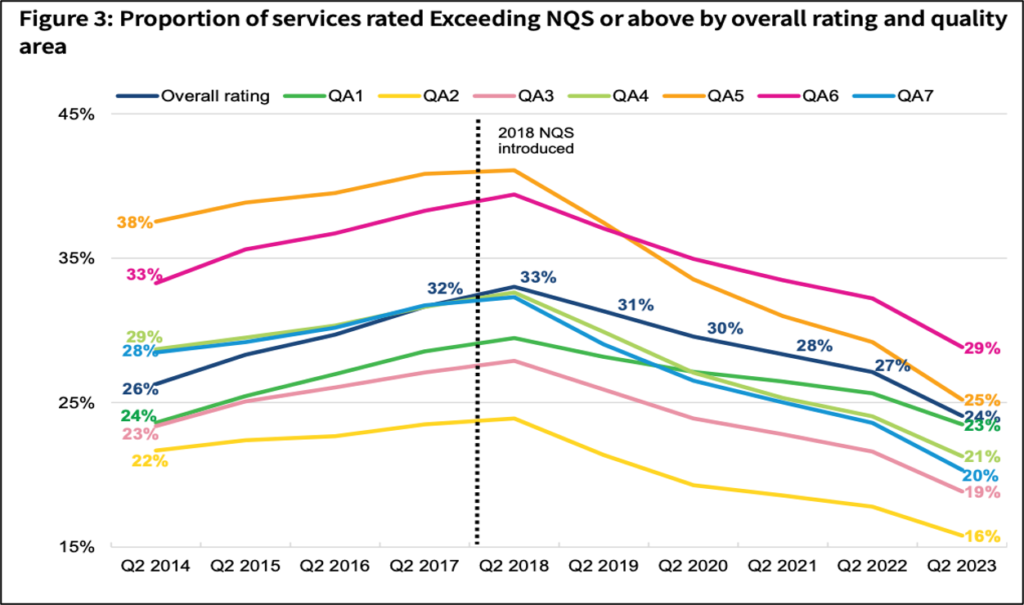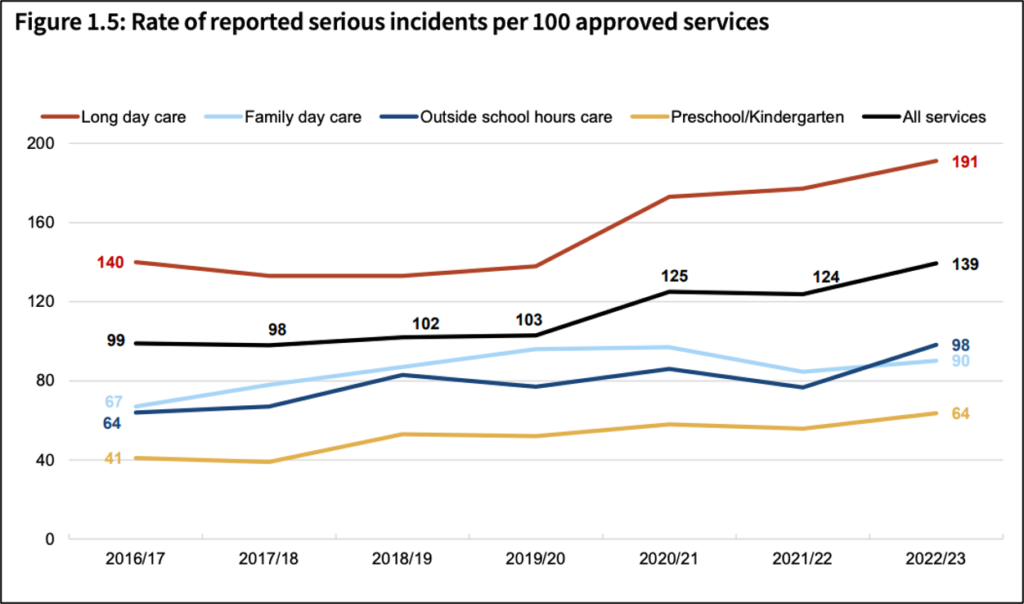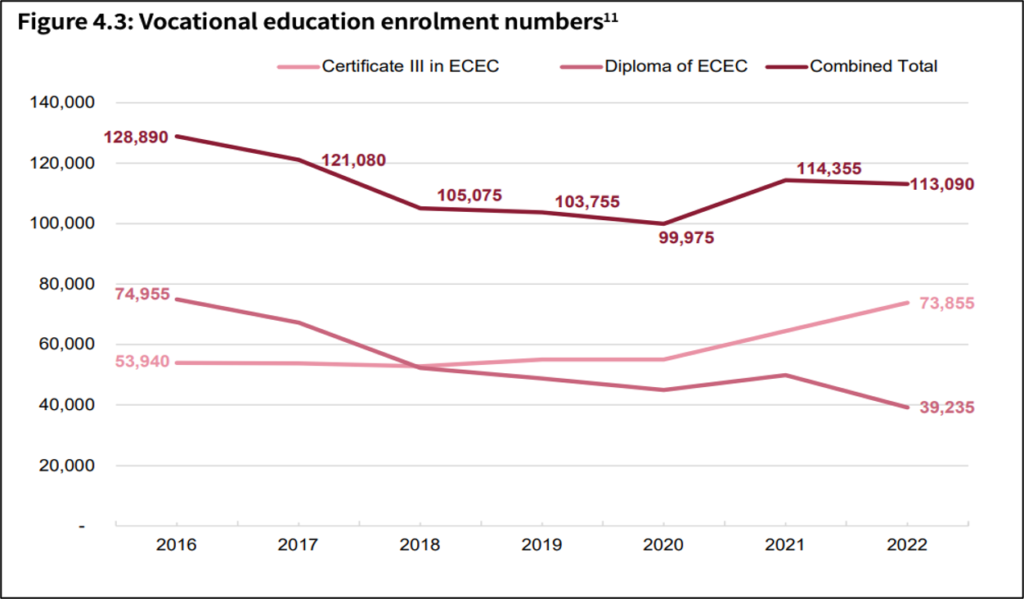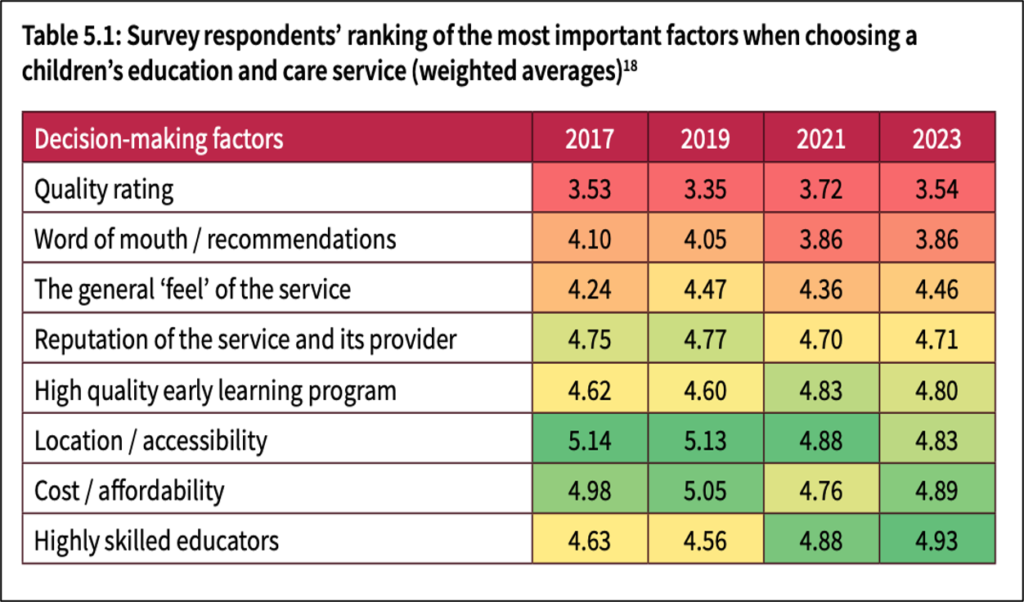Challenges in achieving Exceeding ratings and other key trends highlighted in 2023 NQF Annual Report

The Australian Children’s Education and Care Quality Authority (ACECQA) has released its NQF Annual Performance Report, commenting on the state of the Australian early childhood education and care (ECEC) sector in 2023.
The report examines a range of aspects of the National Quality Framework (NQF) and how they are being implemented with a view to providing context on emerging and established trends impacting the Australian ECEC sector.
This year’s report highlighted a number of important trends in the quality, serious incident and workforce spaces as well as providing details of the result of ACECQA’s fourth biennial family survey.
Quality over time
Over time quality across the ECEC sector (as measured by services meeting or exceeding the National Quality Standard (NQS) ) has improved dramatically, with 89 per cent of services achieving these levels compared to just 62 per cent in 2014.
However, looking deeper into the distribution of performance across the rating levels, the Annual Report calls out the fact that it has “become more challenging” for services to achieve the Exceeding NQS rating since the new version of the NQS was launched in 2018.

Just under one-quarter (24 per cent) of services were rated as Exceeding NQS or above overall as at 30 June 2023, down from one-third (33 per cent) as at 30 June 2018, with a clear inflection point highlighted in 2018 when the new rules were introduced.
Comment: The impact of the new NQS and the consequences on the proportion of services achieving or retaining an Exceeding rating are now well understood across the sector. What may have been less appreciated is that five years later the trend appears to be accelerating, not stablising as one would expect.
Serious incidents and confirmed breaches
Overall health and safety quality ratings continue to improve with a new record of 93 per cent of all services achieving meeting or above the NQS in Quality Area 2 led by the preschool setting at 98 per cent, then long day care (LDC) and outside school hours care (OSHC) at 93 per cent and 92 per cent respectively.
That being said, there has also been an increase over time in the number of serious incidents reported,and breaches confirmed, across each of the four main ECEC settings, although LDC does dominate given the significantly higher number of children attending a service over the course of a day.

Confirmed breaches follow a similar pattern to reported incidents however one notable difference can be seen when looking at the quality rating of the service concerned, with working towards centres reporting a similar number of serious incidents per 100 services to meeting and above rated services, but 2.5 times more actual breaches than working towards and more than five times more breaches than an exceeding centre.
Comment: The pick up in numbers over time may simply be a function of more effective and consistent reporting on behalf of service providers but the differential between working towards and exceeding breaches truly reflects the importance of quality and how it impacts the wellbeing of children and reinforces the importance of exerting tangible efforts to support working towards services to improve their ratings.
Workforce
Although the data series has a longtime lag the ACECQA Annual Report provides valuable insights into trends around vocational training enrolments and completion rates in the ECEC sector and also those for early childhood teachers too.
This year ACECQA reports that as of 2022, the most recent year available, the number of enrolments in the Certificate III in ECEC was up 15 per cent since 2021 although the number of enrolments in the Diploma fell 21 per cent to 39,235.

From a higher education perspective the uptick in early childhood teacher (ECT) commencements continued this year with a key standout being that while the majority (54 per cent) of graduates continued to seek employment in schools, there was a large uptick of graduates working in ECEC settings and also of primary school graduates obtaining employment in ECEC settings.
Comment: The fall off in diploma enrolments will be of particular concern for policy makers and approved providers alike as they not only are a key part of the service workforce structure but also are an important source of upskilling candidates whilst the uptick in ECT’s opting for ECEC is certainly good news.
Biennial families survey
ACECQA conducts a family survey every two years to better understand how different factors and information sources are involved in ECEC service decision making, and to gauge the level of awareness and understanding of education and care service quality ratings.
The 2023 survey once again confirmed the importance of high quality educators to a parents decision when choosing an ECEC service for their children closely followed by cost / affordability that saw a large increase this year compared to last rising from fourth most important factor to second.

Interestingly for the fourth survey running the quality rating is deemed the least important factor in a parents decision although it must be said that highly skilled educators and a high quality early learning program are proxies for quality, albeit subjective ones.
Comment: It’s amazing to think that in the 2017 and 2019 surveys skilled educators were deemed less important than location, cost and reputation in the eyes of families and encouraging now to see that families are really starting to appreciate how important the ECEC workforce is to the delivery of quality ECEC.
To review this year’s NQF Annual Performance Report please click here.
Popular

Policy
Practice
Provider
Quality
Research
NSW’s new child protection reforms set national precedent, with implications for ECEC sector
2025-05-26 10:23:37
by Fiona Alston

Practice
Quality
Research
Unlocking the power of intentional teaching
2025-05-21 11:00:08
by Fiona Alston

Practice
Quality
Research
Beyond the screen: Reclaiming presence in infant toddler documentation
2025-05-28 15:05:21
by Contributed Content

















